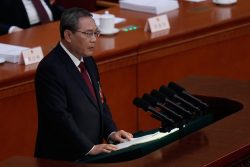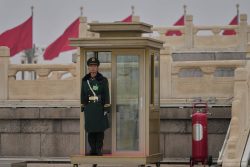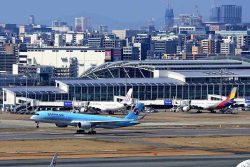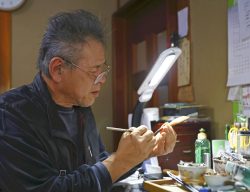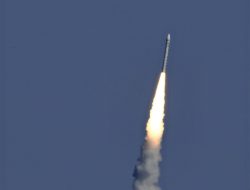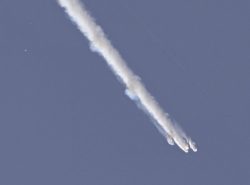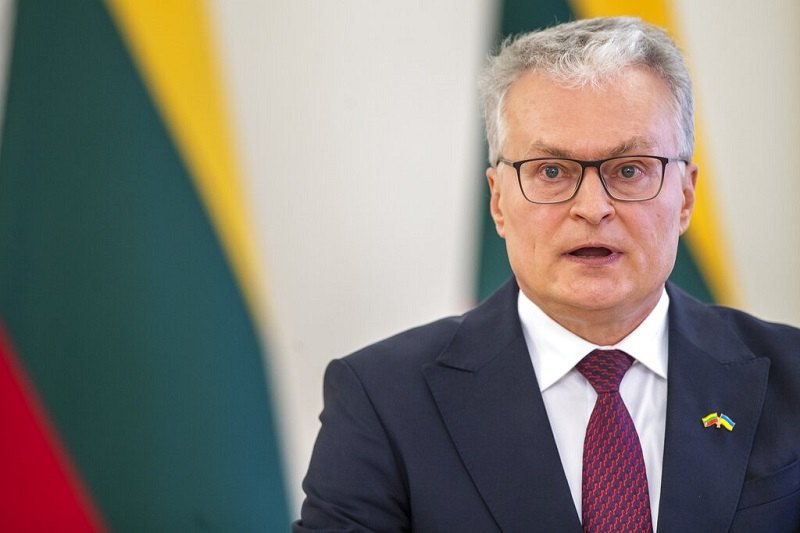
Lithuanian President Gitanas Nauseda speaks a media conference at the Presidential palace in Vilnius, March 21, 2022. Lithuania says it has cut itself off entirely of gas imports from Russia, apparently becoming the first of the European Union’s 27 nations using Russian gas to break its energy dependence upon Moscow.
12:25 JST, April 4, 2022
VILNIUS, Lithuania (AP) — Lithuania says it has cut itself off entirely of gas imports from Russia, apparently becoming the first of the European Union’s 27 nations using Russian gas to break its energy dependence upon Moscow.
“Seeking full energy independence from Russian gas, in response to Russia’s energy blackmail in Europe and the war in Ukraine, Lithuania has completely abandoned Russian gas,” Lithuania’s energy ministry said in a statement late Saturday, adding that the measure took effect in the beginning of April.
Lithuania managed to reduce imports of Russian gas to zero on Saturday, a move seen a milestone in achieving energy independence in the former Soviet republic of 2.8 million, the ministry said.
“We are the first EU country among Gazprom’s supply countries to gain independence from Russian gas supplies, and this is the result of a multi-year coherent energy policy and timely infrastructure decisions,” Minister of Energy Dainius Kreivys said.
Lithuanian President Gitanas Nauseda posted an upbeat tweet on his account and urged other European nations to do the same.
“From this month on — no more Russian gas in Lithuania. Years ago, my country made decisions that today allow us with no pain to break energy ties with the aggressor. If we can do it, the rest of Europe can do it too!” Nauseda tweeted.
In 2015, nearly 100% of Lithuania’s gas supplies derived from imports of Russian gas but the situation has changed drastically over the past years after the country built an off-shore LNG import terminal, launched in 2014, in the port city of Klaipeda.
The energy ministry said from now on all gas for Lithuania’s domestic consumption would be imported via Klaipeda’s LNG terminal.
Last year, some 26% of Lithuania’s gas supplies derived from deliveries from a Russian gas pipeline while 62% came via Klaipeda’s LNG terminal and the remaining 12% were imported from a gas storage in neighboring Latvia.
Baltic neighbors Latvia and Estonia are also heavily dependent on Russian gas but the operator of Latvia’s natural gas storage said none of the three Baltic states were importing Russian gas as of April 2.
Uldis Bariss, the CEO of Conexus Baltic Grid, told Latvian media on Saturday that the Baltic gas market was currently being served by gas reserves stored underground in Latvia.
Last month, Lithuanian Prime Minister Ingrida Simonyte said Klaipeda’s LNG terminal wouldn’t have enough capacity to provide gas for all the three Baltic countries.
As a solution, Estonia’s government has proposed building a LNG terminal jointly with Latvia and Nordic neighbor Finland in the Estonian port town of Paldiski, which is not far from the capital, Tallinn.
Top Articles in News Services
-

Survey Shows False Election Info Perceived as True
-

Hong Kong Ex-Publisher Jimmy Lai’s Sentence Raises International Outcry as China Defends It
-

Japan’s Nikkei Stock Average Falls as US-Iran Tensions Unsettle Investors (UPDATE 1)
-

Japan’s Nikkei Stock Average Touches 58,000 as Yen, Jgbs Rally on Election Fallout (UPDATE 1)
-

Japan’s Nikkei Stock Average Rises on Tech Rally and Takaichi’s Spending Hopes (UPDATE 1)
JN ACCESS RANKING
-

Producer Behind Pop Group XG Arrested for Cocaine Possession
-

Japan PM Takaichi’s Cabinet Resigns en Masse
-

Man Infected with Measles Reportedly Dined at Restaurant in Tokyo Station
-

Israeli Ambassador to Japan Speaks about Japan’s Role in the Reconstruction of Gaza
-

Videos Plagiarized, Reposted with False Subtitles Claiming ‘Ryukyu Belongs to China’; Anti-China False Information Also Posted in Japan


